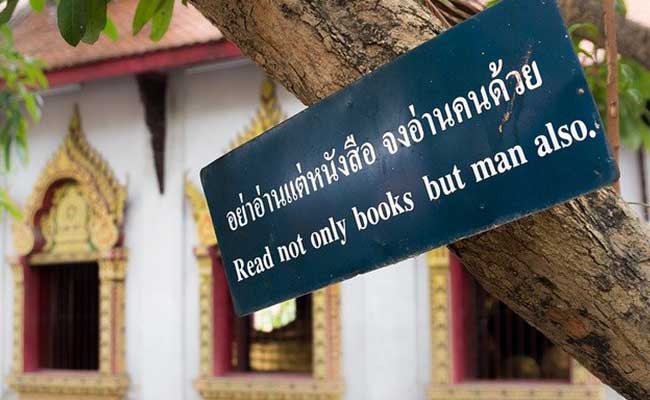Mai pen rai is one of the most commonly used phrases in Thailand.
But it isn't just a phrase. It has a cultural significance that reflects an attitude to life, and, as we'll discuss, it doesn't always mean what us “foreigners” think it means.
Don't Worry, It's Okay
The most commonly understood meaning of mai pen rai is “Don't worry”, which is wrapped up in a “Let it go” mentality.
Let's say you arrive at the train station with your partner just as your train pulls away.
Instead of getting stressed because the next train isn't for another 25 minutes, your partner says “Mai pen rai, let's grab a coffee and sit down for a while”.
While you're still cursing your lateness, and your partner because she took ages doing her hair back at the house, your partner has already moved on from the situation and is looking forward to her coffee.
In this context, mai pen rai can be used to calm someone down, to tell them to “chill out”.
This use of mai pen rai is typical of Thai culture. In Thai society it is better to avoid stress and anger and instead let things go and remain calm and happy, especially things that are insignificant when looking at life's bigger picture.
You're Welcome (no problem)
Let's say that upon arrival to your hotel you are greeted with a complimentary room upgrade. You express your thanks to the receptionist by saying, “Thank you so much. That's really kind of you!”
You will likely get a “Mai pen rai” in response, coupled with a big smile.
In this case it is more of a “You're welcome (it's no problem)” than a “Don't worry” or “It's okay”.
No Thank You
Mai pen rai can also be used to say (indicate) a “No thank you”.
For example, if sharing a cake among friends and you are offered the last slice, you might say “Mai pen rai” to indicate that you don't want it.
You might instead say “Mai ao krap/ka”, which means “I don't want it , thank you”.
Please note that you should also put khrap (male) or ka (female) on the end of your sentences, as explained in this lesson.
Yes Please (But Greng Jai)
And then there is the hesitant “Mai pen rai”, which subtly means “Yes, I do want it, but I'm being polite and not wanting to cause inconvenience”.
This is what I call mai pen rai combined with greng jai, which I've written about here.
In this case, you do want the last slice of cake but don't want to put yourself before anyone else who might also want it, or to appear greedy.
In this situation it is up to your friend(s) to say, “Oh go on, you have it” at least a couple of times before you graciously accept the slice.
How is a foreigner like me supposed to know when a mai pen rai means a yes or a no?
Through experience: The longer you've been in Thailand, and most importantly how well you know someone, the better placed you'll be to spot the ambiguity. If you have a Thai partner, you'll soon pick it up.
Last Updated on



sidney leonard says
However, I qualify for the Baht 40,000 per month option specified on the Immigration Bureau website,“In the case of marriage to a Thai woman, the alien husband must earn an average annual income of no less than Baht 40,000 per month and attach documentation such as any particular individual income tax return together with payment receipt, evidence of receiving retirement pension... I assume an income verification letter provided by the state teachers retirement system of Ohio (STRS) would suffice, and/or US-IRS income tax return(s).
I assume there are many retirees in Thailand who qualify for this option; I would appreciate any comments regarding pertinent details regarding same from anyone who has experience with it, or anyone else who has knowledge of it. For example, my wife and I have a joint savings account at the Bangkok Bank, but I need to know if I must open an account in my name only, and any other requirements regarding this matter before we make our move to Thailand. Btw, we married 30 years ago and have resided in the US since then; it's time to return to my wife's homeland and I want the move to be as uneventful as possible. My sincere thanks.
Oct 04, 2022 at 7:49 am